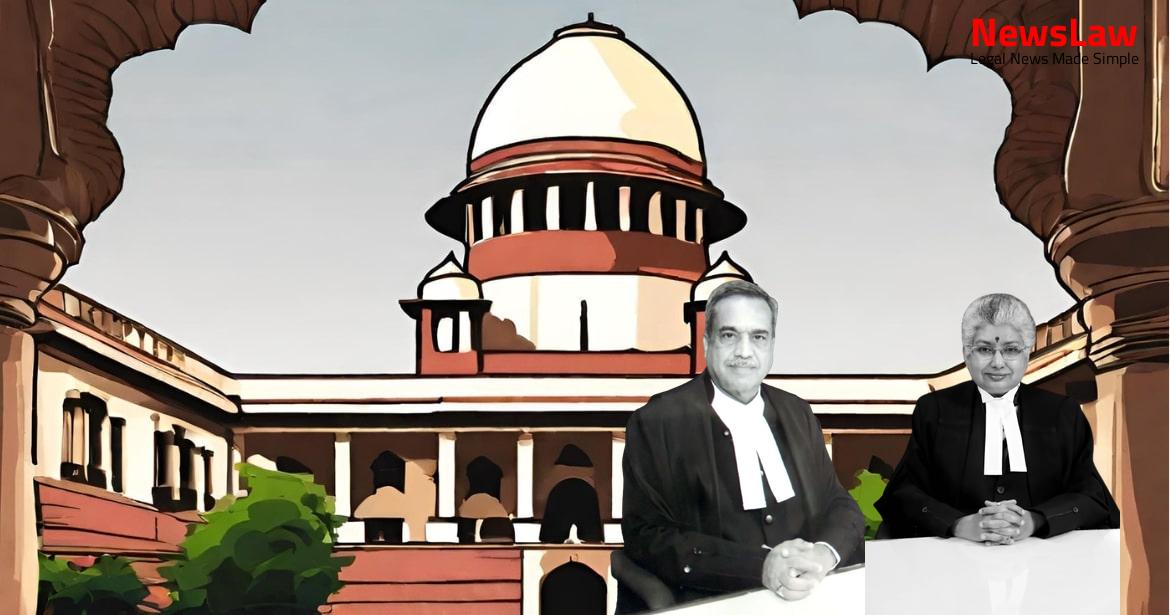Delve into the detailed legal analysis carried out by the court regarding seniority fixation in contempt petitions. The court’s examination of the principles governing seniority based on merit selection as opposed to roster points offers valuable insights into the complexities surrounding the issue.
Facts
- Contempt petitions filed due to alleged non-compliance of court order dated 22 January 2016.
- Petitioners challenged inter se seniority list published on 29 April 2004.
- Selectees appointed in Tamil Nadu Public Works Department in 2000.
- TNPSC challenged by selectees through SLPs 2890-2894 of 2016.
- Representation by R. Balakrishnan regarding seniority allocation rejected by TNPSC on 20 December 2004.
- Various writ petitions filed in Madras High Court by aggrieved parties.
- Court directed redoing the seniority fixation exercise within 12 weeks.
- Developments occurred in the interim period.
- Sections 1(2), 40 and 70 of the Tamil Nadu Government Servants (Conditions of Service) Act, 2016 were declared as ultra vires and unconstitutional.
- The Division Bench of the Madras High Court dismissed review petitions and contempt petitions related to the implementation of a judgment dated 22 January 2016.
- Certain selectees challenged the non-revision of seniority list by filing SLP(C) Nos. 12114-12117 of 2021, which were dismissed by this Court.
- A judgment and order dated 15 November 2019 of the High Court were challenged before this Court through SLP(C) Nos. 2861-2876 of 2020.
- Section 40 of the said Act, determining seniority based on reservation and rotation, was challenged in writ petitions before the Madras High Court.
- The Single Judge of the Madras High Court dismissed the writ petitions on grounds of delay and laches, leading to appeals before the Division Bench.
- The Division Bench, through a judgment and order dated 31 March 2015, set aside the Single Judge’s decision and directed officials to use TNPSC rank for seniority fixation.
- The State of Tamil Nadu enacted the said Act to overcome the judgments of the High Court and this Court regarding seniority fixation.
Also Read: Judicial Review of Selection Process for DGP Appointment
Arguments
- Petitioner argued that the seniority list must be prepared based on merit list of selection and not on roster points.
- Petitioner alleged that the respondent authorities have not implemented the court’s order and have published a revised seniority list in breach of the judgment.
- Petitioner claims that the respondent authorities have committed aggravated contempt of court and perjury by publishing the revised seniority list.
- Counter arguments from respondents claim that the contempt petitions are without merit.
- Respondents argue that relief granted in the earlier judgment was only for individual petitioners and not for all employees.
- Respondents contend that upsetting the rights of parties after two decades would cause discontent among employees.
- Respondents argue that if the official respondents misinterpreted the court’s judgment, it cannot be considered willful contempt.
- Respondents assert that any contempt would be of the High Court order, not of this Court.
- Respondents claim that the dismissal of SLPs by this Court does not amount to a merger and hence no contempt of this Court can be alleged.
- Respondents warn against entertaining contempt petitions after the dismissal of SLPs, as it could lead to a floodgate of such petitions.
- Attorney General for India representing Tamil Nadu Public Service Commission raised an issue.
- The issue was regarding a conflicting view by another Judgment of Madurai Bench of the Madras High Court, resulting in an SLP pending in the Supreme Court.
- However, the issue was resolved as the Supreme Court decision in Bimlesh Tanwar case covered it.
- The pendency of the SLP had no significance after the decision in Bimlesh Tanwar case.
- The Attorney General argued that the earlier SLP should also be covered by the Bimlesh Tanwar case.
Also Read: Legal Analysis on Ownership of Jewelry in Arbitration Case
Analysis
- The Division Bench noted that the seniority list drawn by the Service Commission in 2000 was in line with the judgment in P.S. Ghalaut v. State of Haryana & Others.
- The list approved by the State Government did not achieve finality as the seniority list issued in 2004 was impacted by the judgment in Bimlesh Tanwar v. State of Haryana.
- The principle post the Bimlesh Tanwar judgment was that seniority list should be based on merit selection, not roster points.
- The High Court, applying this fundamental principle, passed the impugned judgment based on the merit list of selection, not roster points.
- The court is only concerned with wilful or deliberate non-compliance of the directions in the original judgment.
- Contempt jurisdiction does not allow the court to issue any supplementary directions beyond the original judgment.
- The basic principle regarding determination of seniority is based on the merit list of selection, not on roster points.
- The dismissal of Special Leave Petitions (SLPs) with reasons does not invoke the doctrine of merger, even if Article 141 of the Constitution applies.
- The Supreme Court’s order of dismissal with reasons is binding and serves as a declaration of law under Article 141.
- Even for cases where leave is not granted, the Supreme Court’s ruling on an issue still holds weight and is considered as law declared.
- Various arguments were advanced by the Senior Counsel for the respondent authorities but cannot be considered in contempt jurisdiction.
- The matter between the parties has achieved finality by the court’s order dated 22 January 2016.
- The published seniority list is in breach of the court’s directions.
- The law declared in the court’s order binds all courts and tribunals and is applicable between the parties.
- Respondents were obligated to follow the law set by the Court and determine seniority based on TNPSC selection, not roster points.
Also Read: Reformation vs Retribution: Legal Analysis of Death Penalty Imposition
Decision
- Selectees with lower marks placed above those with higher marks in the seniority list.
- Specific persons named in the order found guilty of contempt of court.
- Hearing on the quantum of punishment for the guilty parties to be held within 12 weeks.
- Revision and publication of seniority list to be based on merit, not roster point.
- Issues related to selectees selection process and contempt petitions addressed.
- Matter regarding quantum of punishment to be discussed on 10 January 2022.
Case Title: V. SENTHUR Vs. M. VIJAYAKUMAR, IAS, SECRETARY TAMIL NADU PUBLIC SERVICE COMMISSION AND ANR (2021 INSC 591)
Case Number: CONMT.PET.(C) No.-000638-000638 / 2017



